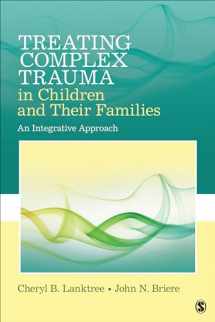
Treating Complex Trauma in Children and Their Families: An Integrative Approach
Book details
Summary
Description
One of the few books on the treatment of psychological trauma in children that provides specific, in-depth individual, group, and family therapy interventions for complex psychological trauma, Treating Complex Trauma in Children and Their Families: An Integrative Approach focuses on the treatment of 6-12 year-old children and their relevant family members. Renowned authors Cheryl B. Lanktree and John N. Briere use their evidence-based, yet flexible treatment model, Integrative Treatment of Complex Trauma for Children (ITCT-C), as they address the use of play therapy, attachment processing, mindfulness, and other approaches, as well as interventions with family/caretaker and community systems. The authors emphasize a culturally sensitive, destigmatizing, and empowering perspective that supports both recovery and posttraumatic growth. Clinical examples and specific tools illustrate how assessment is used to guide individualized and developmentally-appropriate interventions.


We would LOVE it if you could help us and other readers by reviewing the book
Book review



